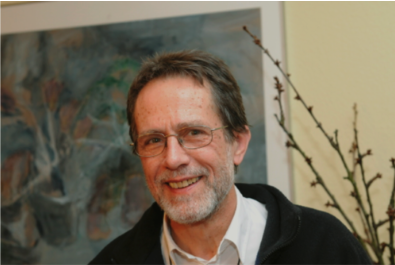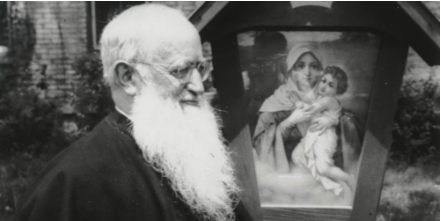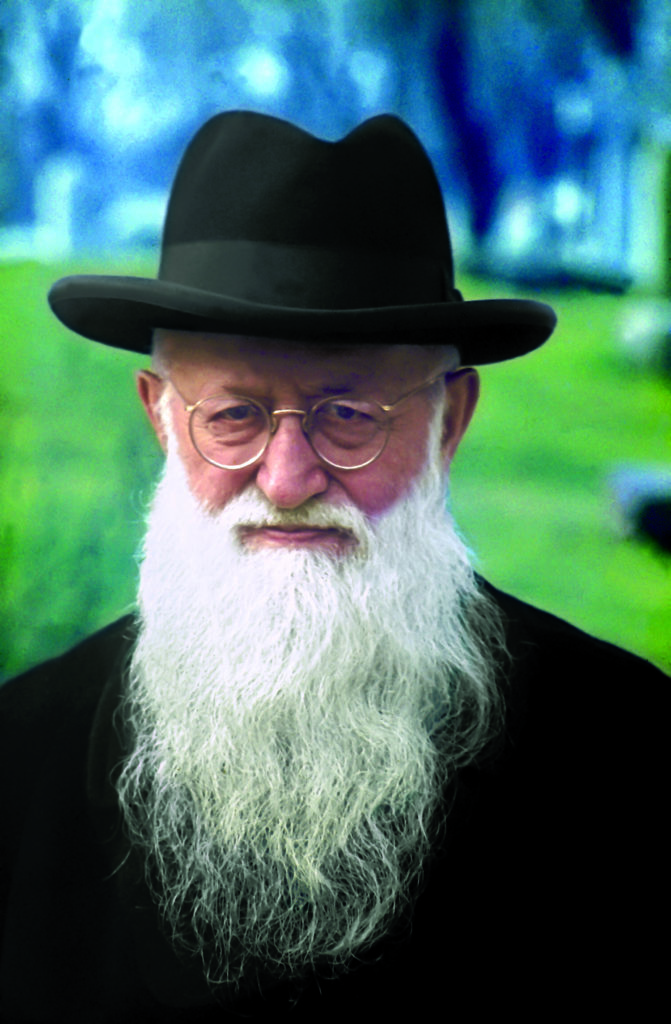An imprudent founder. He decided to open a workshop for souls.
Presentation by Rev. Kurt Faulhaber at the October Meeting in the Pilgrims’ Church in Schoenstatt on October 16, 2020

We publish here the first part: Kentenich Crisis. The second part, Crisis of the Church, is more related to the Church in Germany.
Kentenich crisis and crisis of the Church – at the same time. What do they have to do with each other in the intentions of God? Two events that move our hearts in an extraordinary way. Like two waves that converge and change each other, amplify each other.
I KENTENICH CRISIS
Discussion desired
I remember how surprised I was to hear from our father that the Visitator, Tromp, had a mission for Schoenstatt. Then Alexandra von Teuffenbach is continuing this mission of Fr. Tromp after more than half a century. This is in the interest of our father. The struggles of that time were only the beginning for him![1] In the last years of his life he waited for the moment when the pacified conflicts would break out anew, yes, he wanted to “stir them up.” Not yet “tomorrow or the day after tomorrow,” he told our course four weeks before his death.[2] Now – after decades – the “day after tomorrow” seems to have passed.
Why did he remain silent after his exile? After his return, he saw that the Schoenstatt Family was not ready for a continuation of the struggles. It would first have to be “transformed inwardly”; above all, it would first have to be united again. Are we more transformed today? More united? Let us imagine that Bishop Bätzing would ask Bishop Gerber: Can you get me a written report before the next meeting on what Schoenstatt thinks about the topics of the Synod? Would we find a common answer? Or would hidden fault lines become apparent even within the individual communities? Or does our father want to make us more united through attacks from outside? If the child’s examination of the sisters is attacked today, then each one of us must be able to answer the questions about it. That can unite us.
What is attacked is what God wants to make the focus of our attention. A guiding principle of our father. Now we have our focus! The time when Schoenstatt only wanted to be affirmed by the authorities of the Church seems to be over. Our father, it seems, wants to lead us into the debate on all the controversial issues that the Church is dealing with, at least in Germany, and which may well come to a head and are questions for the universal Church.
At that time he asked Father Menningen: “Alex, do you go with me”? Today he asks us: “My Schoenstatt Family, do you go with me?”
We ask: Where to? What does our father have in mind with the renewed controversy about his person? What could our going along look like?
At that time it was a struggle of our father with the Church regarding her way. He wants to pick up and continue this struggle. For in the Church as a whole, a fierce struggle for her way has flared up.
“Schoenstatt for the Church!”
We read “Dilexit Ecclesiam” as often as we stand at our father’s sarcophagus. It’s not primarily about Schoenstatt, it’s about the Church. When our father fought with the German bishops and the Roman authorities, he put the existence of Schoenstatt at stake. He saw the Church so much in danger that he was willing to sacrifice Schoenstatt. What he once formulated at the time of the Nazi threat, he now prayed in the face of the Church’s rejection: “Do you want to take this child from me? Do you want to see it dead in my arms? Accept the child … its future destiny …”
With this he went beyond the step “All for Schoenstatt” to the step: “Schoenstatt for the Church!” We have to retrace this step again and again.
Object of Attack: Father-Child Relationship
So what was and is being attacked so that we make it our focus, our task?
Father Kentenich is accused again today of “systematic abuse of power and sexual abuse in one case.” In their reports to Rome, the visitators had already drawn “the picture of a highly manipulative founder who systematically impedes the sisters in their freedom of conscience.” [3]
What is the reality behind this distortion? That Father Kentenich gave himself thoroughly and completely as a father and allowed himself to be experienced as a father, that he not only allowed emotions and affective attachments to his person, but affirmed, promoted, and cultivated them, and all of this from the experience that these emotions and attachments are transmitted in his person to God the Father, and through this a vital experience of God the Father and an indissoluble attachment to God grow. And that experiences of childlikeness are reawakened in people, or missing ones are made up for, that adults experience themselves as children and unfold in this father-child relationship, and in doing so, use a child’s language, childlike and also kitschy pictures, songs, and symbols. And all of this enhanced in community. And that they belong to this father and want to be obedient. And that all of this should be that conversion to becoming a child which Jesus demands of everyone who wants to enter the Kingdom of Heaven. (cf. Mt 18:2)
I understand anyone who takes offense at this. After a decade of abuse scandals in the Church, many thousands of times, all these life processes have lost their innocence in public. Whether we like it or not, they are associated with spiritual abuse.
We have every reason to hope that the accusations of sexual abuse will be cleared up. But the task of distinguishing this spiritual father-child world from spiritual abuse, yes, to open it up in its epochal meaning and help it to break through has only just begun. Schoenstatt Family, do you go with me?
Go with you in what sense? On the Path of the Voices of Soul
With the foundation of the federation in Hoerde, a decision was made that is still groundbreaking today: to do “spiritual detail work.” Our father set up the “inner life” [4] as the “program” and solemnly declared its primacy. He followed this path all his life. At his golden jubilee of ordination he declared that he had “undoubtedly absorbed a great deal, a tremendous amount … almost exclusively in and from souls – healthy and sick, striving and depressed souls of every state of life … Everywhere I was allowed … to listen to the most delicate and finest movements of the human heart, but also the most powerful and passionate ones – whether they were men or women, priests or laymen – and to learn to distinguish between the spirit of man and the spirit of God, the word of man and the word of God.” “In the end, it was about God’s voice everywhere.” [5]
Let me say in advance: This seems to me to be God’s call to us through the events of the Causa Kentenich – as our contribution to the present Church.

My main activity consisted of being available day and night to help …
New Foundation from the Life of Souls [6]
The orientation to the voices of the soul is completely indispensable for times of a new foundation of Schoenstatt. Our father wrote to Father Menningen (I will shorten the quote): “Let me tell you how Schoenstatt … has developed since 1919. After I had opened the hearts and created a certain atmosphere through a few talks, my main activity consisted in being available day and night to help individuals to solve their spiritual and emotional problems, to serve them, to help them solve their psychological complexes, especially the obsessive-compulsive disorder which had become so widespread during the war.”[7]
A note: The voices of being and the voices of time have the same significance as the voices of the soul. But I must limit myself here to the voices of the soul – the others resonate with it.
My Experience: Reverence and Attention
In my personal almost two-hour evening talk with our father, I noticed the following: Since I couldn’t talk, he himself had to lead the conversation by asking questions. He didn’t ask any indiscreet questions, only the type that could be asked over a glass of beer and with an audience: how I finance my studies, my favorite subjects, who did the cooking for us, etc. But his interest caused me to gradually start telling more, and things that were more personal, and after about one and one half hours I was finally able to say what I had come to say and what was important to me.
On the one hand, I experienced his great reverent reserve and respect for my personality and freedom, and on the other hand, I experienced his entering into the depths of the soul when I freely opened it to him. If this reverence for freedom were missing, it would have been a matter of spiritual abuse. No trace of it – according to my experience.
Paying Attention to Needs
How does this path go from the outer to the inner life, from the surface to the depth of the soul? According to a self-testimony of our father, when he met a person, he paid attention to his needs[8], but not only the expressed ones, but also the unexpressed ones. Not only those that were conscious to the other person, but also those that remained unconscious.[9] The path of needs led deeper and deeper. According to our father, I experienced myself “over time more and more as a treasure digger … who was allowed to extract precious metal from the secret and most secret deep gold mines of noble women’s souls, which of course needed purification, and purification in many regards.”[10]
To Love and Be Loved
To stay with this image: As he descended into the depths of needs, he perceived how all needs met in the one: to be loved and to be able to love. The rootstock from which all needs emerge. The unquenchable longing to love and to be loved manifested itself in various forms: motherly love, fatherly love, love in partnership/marriage, love of siblings, love of friends and – deepest and most originally: childlike love.
Transmission to God
Now comes a groundbreaking and momentous insight: Here is the water chamber of experience of God and relationship with God. The through and through human basic experience of the soul – to be wanted, loved, accepted, protected – can jump over to God. Can, must not – for that is grace. In biblical words: Here the word becomes flesh and dwells in the soul of the human person.
He recognized: If the reference to God is not fed from this human source, which lets it become vital, emotional, and can penetrate the person to the unconscious depths of the soul, then God remains an idea without experience. A practice without soul, which one can easily give up. We are currently experiencing this as a mass phenomenon.
This basic experience is always also a basic disappointment, because it carries injuries in itself. We often carry them with us for a lifetime. Depending on their severity, they can make us ill. But disappointments can also turn into longing. Basic experience and basic disappointment unconsciously shape our relationships with other people throughout our lives. And – this is what matters in our context – they are transferred to our idea of God and our relationship with God.
The Inner Child
The decisive procedure for God to “awaken in the soul” is therefore to touch, open up, set free, and heal the trapped soul of the child reaching back into early childhood, and as far as possible to make up for missing experiences.
This is exactly what our father did: groundbreaking.
Just how much a need of contemporary people is touched by this is shown by the fact that Stefanie Stahl’s books on these issues are on the top ranks of bestseller lists, are sold by the millions, and the author is regularly sought as an expert for the press and talk shows. Her most recent work: The Child in You Must Find a Home. The Key to Solving (Almost) All Problems.
Experiencing God in the Human Father
Father Kentenich, who for decades had put his person in the background in an almost exaggerated way, radically changed his attitude in response to these insights: he allowed God to make his divine fatherliness and fatherly action tangible in him as a fatherly human being, to allow spiritual attachments to his person to grow, in order to draw the hearts of people to himself, the divine Father, through these bonds.[11]
And, further: “Our father allowed people to unfold, show and express their emerging childlike needs in various forms, trusting that even in immature, exaggerated things there was real gold hidden that needed to be purified.
Imprudent founder, decided to open a workshop for souls
Let me speak humanly for once, in a very unenlightened way: All this became fateful for Father. In this way, he made himself as a target for being misunderstood, attacked, viewed with suspicion, and intolerable. Until today!
He took this upon himself with his eyes wide open. Out of love for God: to open a way into the soul of the human person.
Out of love for the human person of today: to show him a way to God, as the human heart seeks him.
Out of love for the Church: to develop for her a type of evangelization corresponding to a pedagogy and psychology for the modern human person.
To this end he did the most unwise thing imaginable: he decided to open his “workshop for souls” to all those responsible for pastoral care – in his own words, “to lay out all the cards, without exception” (Apologia 046), yes, “to step out into the public eye of the Church with indiscriminate openness” (009). Tragically, he reached only a few officials with his statements, for whom his long treatises became too much. Only now did Ms. von Teuffenbach provide him with the publicity he desired, and indeed “with indiscriminate openness.”

[1] cf. Retreat of the Young Priests’ Association in Würzburg 1966. 11-25-1966. First talk, pp. 273-282.
[2] “You must therefore take this for granted, and must expect it, perhaps not yet tomorrow or the day after tomorrow; at any rate, I personally do everything possible to avoid sparking a conflict, a flaming conflict, in the public of the Church – not often, as I did before. But it will come once, but not yet. Now we have to see to it that we unite, that we become more united… First we have to represent a force; then the moment has come to venture forward, to climb onto the stage of battle, in order to stir up a debate with the Church from there… first we have to be consolidated ourselves, be united, so that no power in the world, but also no power of hell, can tear us apart…. To prepare ourselves, to represent a tower, an impregnable tower for the not insignificant conflicts that we can and must reckon with.” (From the talk for the course consecration of the Pilgrim Course on August 17, 1968)
[3] Die Tagespost, 10-14-2020.
[4] We set up “a program that is equivalent to a solemn depiction of the inner life.” Letter of 11-08-1919, published as the last text in Under the Protection of Mary.
[5] “At the Golden Jubilee of Ordination,” Mount Sion 1985, p. 134f
[6] “To keep the gaze constantly lowered into the soul life of the followers.” “If one wants to read God’s wish and will out of the souls, one must constantly and carefully keep in touch with them, must understand how to open up the souls, to read in them, and to slowly transfer what he has read into the whole family.” Letter to Fr. Menningen on questions of the new foundation of December 9, 1953.
[7] Letter of December 9, 1953 from Milwaukee.
[8] P. Kentenich literally: “all impulses and wishes”
[9] Apologia pro vita mea, Milwaukee 1960 p. 90 (099)
[10] Apologia pro vita mea, Milwaukee 1960, p. 105 (117)
[11] cf. Hos 11:4: “With human fetters I drew them, with bonds of love.”
